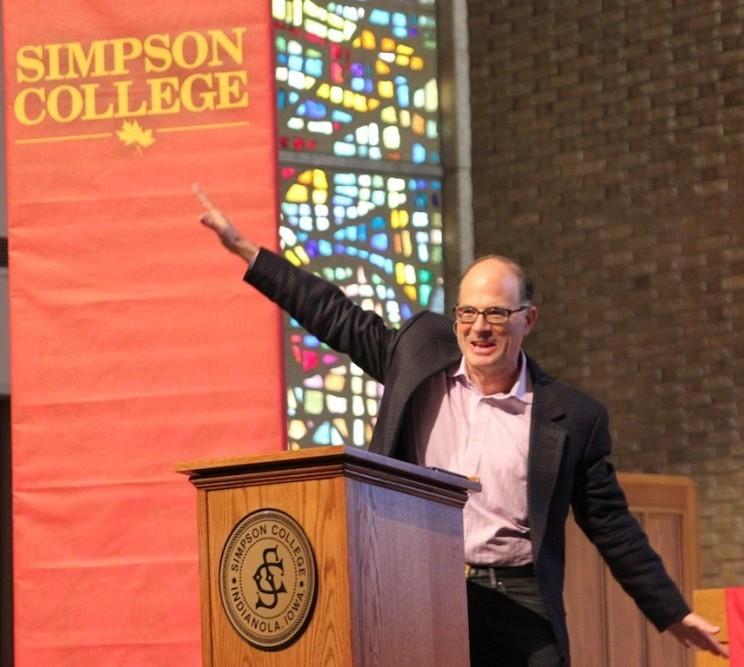‘Golden age of water’ coming to an end, Fishman says
October 4, 2012
It’s common for people to complain about carrying a pack of bottled water across the grocery store parking lot. Imagine being 12-years-old and carrying twice the amount of water for a length of two miles. That’s what children in India do every single day.
Author and reporter Charles Fishman experienced this situation first hand while doing research in India for his new book, ‘The Big Thirst: The Strange Life and Turbulent Future of Water’.
This book was the topic of discussion during Simpson’s 25th annual McBride Lecture Wednesday Oct. 3, where Fishman was they key speaker.
Fishman is an award winning reporter and author, having worked at publications including the Washington Post, the Orlando Sentinel and Fast Company.
Taking a different angle from his first book, titled ‘The Wal-Mart Effect,’ his latest book challenges us to think about a resource we don’t normally think about, water.
At this moment we are experiencing the worst drought in 60 years.
“Drought is just a moment in time of course, but it is a reminder both of how much we take water for granted and how vulnerable we are if we don’t have a smart way, a thoughtful way, of approaching how we use water and how we manage it,” Fishman said.
Fishman says there is no such thing as a global water crisis. While there are very serious water problems all over the world, they aren’t connected to each other. That’s what makes water different from other world problems; they’re local.
That being said, Fishman does think we are on the verge of a water revolution. Over the last 100 years, we’ve lived in a golden age of water.
“Our water has been unlimited, essentially unthinkingly safe and essentially free,” Fishman said. “We never think about where our water came from when we turn on the tap.”
Moving away for the golden age comes the smart age of water, in Fishman’s views.
In this time of smart water, the three qualities of water will not be going forward at the same time.
Las Vegas is a prime example of smart water. Being the driest city in the country, Las Vegas still shows off water in dramatic ways, from 30 feet high waterfalls to 1.6 million gallons of aquariums.
Their population has tripled in the last 20 years but the city hasn’t had to use any more water. They receive water from a single source and are limited on the amount they can take in.
Las Vegas makes this works by being in the time of smart water and doing little things to help save water.
Minor things being limiting golf courses water usage and making it illegal to have a front lawn; major things like recycling.
Recycling is the biggest thing Las Vegas has done. They recycle 94 percent of their water that is drained anywhere in the city.
“It’s possible to make dramatic progress and we have the tools available in most places and the water level to do what we need to do, all we need to do really is pay attention,” Fishman said.
The world of water is changing and Fishman is optimistic of this change.
“We use less water today, as a country, than we did in 1980. We have doubled the size of the economy while reducing the amount of water we use everyday by 10 percent,” Fishman said.
Freshman Josh Eaton attended the lecture and benefitted from doing so.
“The lecture really opened my mind as to what problems are going to arise in the future in relations to water,” Eaton said. “It made me more self conscious about water.”
Fishman’s new book started off with a bottle of Fiji bottled water.
At almost any gas station it’s common to find to Fiji bottled water, yet 53 percent of people living in Fiji don’t have access to clean drinking water. This fact alone led reporter Charles Fishman to travel to the country of Fiji for further investigation.
Fishman then wrote a story about the business of bottled water and the reaction to that story led him to write his most recent book.
In the course of writing the book Fishman traveled to Australia, India and Las Vegas and stood at the bottom of a half-million-gallon sewage tank; learning some astonishing facts about all aspects of water.
Fishman experienced everything from the cleanest water in the world to what he would consider to be the dirtiest.
“The opportunity to travel around the world and meet people and hear both what their water problems are and how they’re solving them; that’s why I love being a reporter,” Fishman said. “That is the pure fun of the job.”





